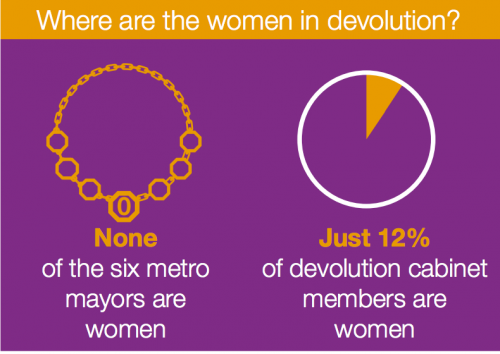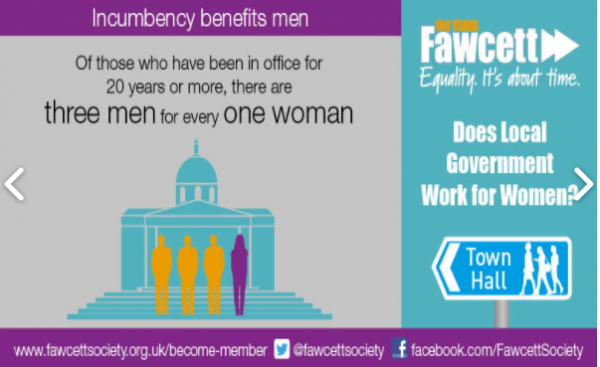
The report finds that while the proportion of women in Parliament has improved steadily (from a low base) by 10 percentage points in the last 10 years, only a third of councillors in England are women, a figure that has scarcely changed over the last two decades.
At this rate of progress, it will be 48 years before the UK achieves a local political class that represents the gender-balance of its community.
At this rate of progress, it will be 48 years before the UK achieves a local political class that represents the gender-balance of its community in English county councils. Even fewer women progress to lead their councils. Councils do not reflect the diversity of our society, with disabled and ethnic minority women experience multiple discrimination.
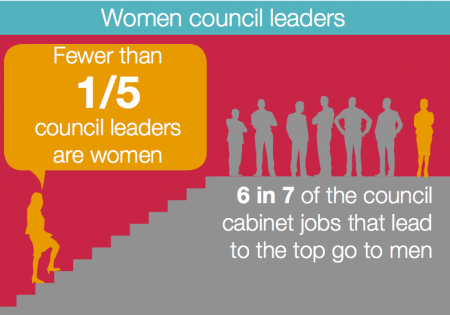
The report highlights that just four percent of local councils in England have a formal maternity, paternity or parental leave policy in place for councillors. As a result, while women councillors are no less ambitious to progress than men, they feel pigeonholed on the basis of their gender, and held back by the way councils operate.
Just 4% of local councils in England have a formal maternity, paternity or parental leave policy in place for councillors.
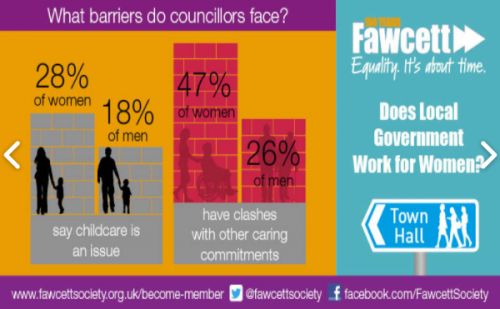
The Commission has found that women face multiple barriers to entering and progressing in local government.
Firstly, there is a lack of flexibility in the role of councillor which works against women. In addition to the widespread lack of parental leave, help with the costs of childcare is patchy, with some councils not offering any support at all. It is not possible for local councils to use technology for councillors to attend meetings remotely, which creates additional barriers for women, particularly those with caring responsibilities.
Secondly, there are significant cultural barriers. Sexism is worryingly commonplace in local government with almost four in ten female councillors having experienced sexist comments from within their own party, and a third from their council colleagues. Women also reported finding it difficult to access informal networks where decision making may take place.
Thirdly, there is an issue with incumbency and lack of ‘churn’ in councillor roles. Eighty percent of council seats go to incumbents at each election, making it very difficult for women and minority groups to break through. Research suggests men tend to remain in their roles for longer – of those councillors serving for 20 years or more, three in four are men.
Fourthly, there are barriers to senior political leadership. Women comprise 30 percent of cabinet members overall – but many of these are in councils where there already is a woman leader. Nine councils still have all-male cabinets. Just one in seven Finance or Economic Development roles (which, rightly or wrongly are often regarded as a typical route to the Leader role) are held by women.
The report is the result of a year-long, cross party survey drawing on evidence from hundreds of councillors across England and Wales, and argues that local governments must modernise to be fit for purpose in the 21st century.
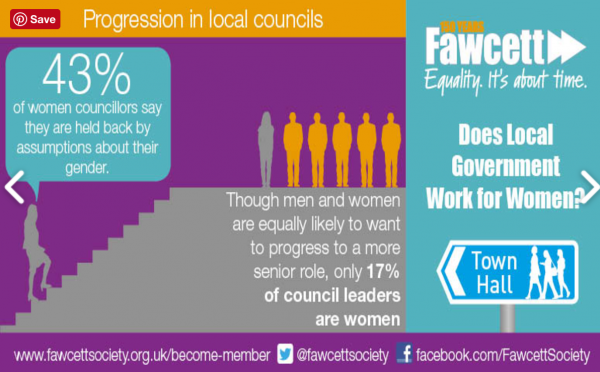
KEY FINDINGS:
- 38% of women councillors have experienced sexist comments within their party, and 33% from other councillors. 10% have experienced sexual harassment.
- Progress has stalled. 33% of councillors are women, up from 28% in 1997, while 29% of MPs are women, up from 19% in 1997.
- 28% of women and 18% of men report childcare as a barrier.
- Only 4% of local councils in England have a formal parental leave policy in place for councillors.
- 47% of women and 26% of men report other caring commitments as a barrier.
- There are 3.5 times as many men aged 18-34 as women on councils. 35% of councillors are aged 65-74, and there are two men for every woman in this age range.
- Of councillors who have been in office for 20 years or more, there were three men for every one woman.
- Men and women are equally ambitious, yet only 17% of council leaders are women.
REPORT RECOMMENDATIONS:
Drawing on existing work and evidence from many sources including interviews with some of these leaders, this report makes a wide range of recommendations that would bring more women into local government and help them to play a full role at all levels. If implemented they will begin to make local government work for women. Just a few of them include:
- Targets for women’s political representation.
- Maternity, paternity and parental leave entitlements for councillors.
- Legalising remote attendance at council meetings, including voting rights.
- More powerful Standards Committees and clearer standards and training.
- Term limits for councillors.
- Requirements for gender balanced Cabinets and formal shadowing opportunities through the creation of ‘deputy Cabinet Member’ roles.
The 2017 July Fawcett Report Does local government work for women? is available to download from the Fawcett Society’s website. And you can read a blog by one of the Report authors, Sam Smethers, here as she outlines how the one year investigation reaped significantly worse results than the research team had anticipated.
